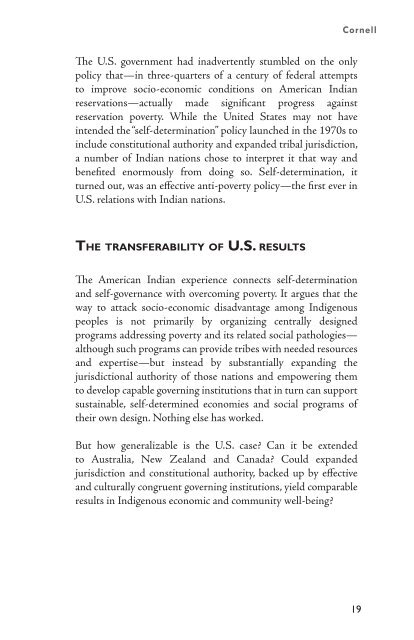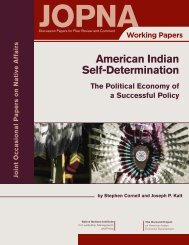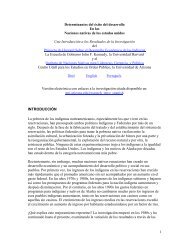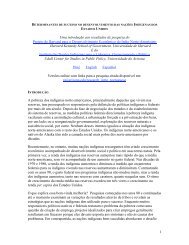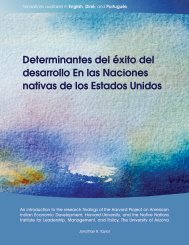<strong>Indigenous</strong> <strong>Peoples</strong>, <strong>Poverty</strong> <strong>and</strong> <strong>Self</strong>-<strong>Determ<strong>in</strong>ation</strong><strong>Self</strong>-determ<strong>in</strong>ation as an anti-poverty policyAs already noted, when the U.S. moved to the “self-determ<strong>in</strong>ation”policy, its <strong>in</strong>tent was modest: to br<strong>in</strong>g Indian nations <strong>in</strong>to theadm<strong>in</strong>istration of federal programs <strong>and</strong> quash Indian compla<strong>in</strong>tsabout lack of <strong>in</strong>put. But with the federal government on thedefensive, <strong>and</strong> presented with a policy that paid at least lipservice to the idea of tribal control over tribal futures, manyIndian nations moved quickly to assert self-govern<strong>in</strong>g powers,variously redesign<strong>in</strong>g govern<strong>in</strong>g <strong>in</strong>stitutions previously designedby outsiders, tak<strong>in</strong>g over management of resources, retool<strong>in</strong>gdevelopment strategies, <strong>and</strong> displac<strong>in</strong>g federal decision-makers <strong>in</strong>an assortment of reservation matters. Some of these assertionswere confrontational. Others unfolded <strong>in</strong>crementally as triballeaders took the <strong>in</strong>itiative <strong>in</strong> governmental reorganization <strong>and</strong>constitutional reform, searched for alternative fund<strong>in</strong>g sourcesthrough bus<strong>in</strong>ess enterprises, excluded federal representativesfrom decision processes, stopped ask<strong>in</strong>g permission before act<strong>in</strong>g,<strong>and</strong> filled the governmental gaps left by <strong>in</strong>adequate, <strong>in</strong>competentor paternalistic federal adm<strong>in</strong>istration.As they did so, those nations that also backed up their assertedpowers with effective <strong>and</strong> culturally congruent govern<strong>in</strong>g<strong>in</strong>stitutions began to see significant results. Among these werereduced unemployment, reduced welfare rolls, the emergenceof viable <strong>and</strong> diverse economic enterprises—both tribal <strong>and</strong>private—on reservation l<strong>and</strong>s, more effective adm<strong>in</strong>istration ofsocial services <strong>and</strong> programs, <strong>in</strong>clud<strong>in</strong>g those address<strong>in</strong>g language<strong>and</strong> cultural concerns, <strong>and</strong> improved management of naturalresources. In case after case, such nations proved to be much betterat runn<strong>in</strong>g their own affairs <strong>and</strong> manag<strong>in</strong>g their own resourcesthan federal adm<strong>in</strong>istrators had ever been. 1818. Cornell <strong>and</strong> Kalt (1992, 1998); Cornell et al. (1998); Jorgensen (1997,2000b); Jorgensen <strong>and</strong> Taylor (2000); Krepps (1992); Krepps <strong>and</strong> Caves(1994); Wakel<strong>in</strong>g et al. (2001); Harvard Project on American Indian EconomicDevelopment (1999, 2000, 2003).18
CornellThe U.S. government had <strong>in</strong>advertently stumbled on the onlypolicy that—<strong>in</strong> three-quarters of a century of federal attemptsto improve socio-economic conditions on American Indianreservations—actually made significant progress aga<strong>in</strong>streservation poverty. While the United States may not have<strong>in</strong>tended the “self-determ<strong>in</strong>ation” policy launched <strong>in</strong> the 1970s to<strong>in</strong>clude constitutional authority <strong>and</strong> exp<strong>and</strong>ed tribal jurisdiction,a number of Indian nations chose to <strong>in</strong>terpret it that way <strong>and</strong>benefited enormously from do<strong>in</strong>g so. <strong>Self</strong>-determ<strong>in</strong>ation, itturned out, was an effective anti-poverty policy—the first ever <strong>in</strong>U.S. relations with Indian nations.The transferability of U.S. resultsThe American Indian experience connects self-determ<strong>in</strong>ation<strong>and</strong> self-governance with overcom<strong>in</strong>g poverty. It argues that theway to attack socio-economic disadvantage among <strong>Indigenous</strong>peoples is not primarily by organiz<strong>in</strong>g centrally designedprograms address<strong>in</strong>g poverty <strong>and</strong> its related social pathologies—although such programs can provide tribes with needed resources<strong>and</strong> expertise—but <strong>in</strong>stead by substantially exp<strong>and</strong><strong>in</strong>g thejurisdictional authority of those nations <strong>and</strong> empower<strong>in</strong>g themto develop capable govern<strong>in</strong>g <strong>in</strong>stitutions that <strong>in</strong> turn can supportsusta<strong>in</strong>able, self-determ<strong>in</strong>ed economies <strong>and</strong> social programs oftheir own design. Noth<strong>in</strong>g else has worked.But how generalizable is the U.S. case? Can it be extendedto <strong>Australia</strong>, New Zeal<strong>and</strong> <strong>and</strong> Canada? Could exp<strong>and</strong>edjurisdiction <strong>and</strong> constitutional authority, backed up by effective<strong>and</strong> culturally congruent govern<strong>in</strong>g <strong>in</strong>stitutions, yield comparableresults <strong>in</strong> <strong>Indigenous</strong> economic <strong>and</strong> community well-be<strong>in</strong>g?19
- Page 1 and 2: Joint Occasional Papers on on Nativ
- Page 3 and 4: CornellIndigenous Peoples, Poverty
- Page 5 and 6: CornellIndigenous Peoples, Poverty
- Page 7 and 8: CornellIndigenous Peoples, Poverty
- Page 9 and 10: CornellObviously the differences ar
- Page 11 and 12: CornellCommonalitiesAlthough there
- Page 13 and 14: CornellThe present inquiry, while p
- Page 15 and 16: CornellCentral governments, on the
- Page 17 and 18: Cornellstark discrepancy between In
- Page 19 and 20: Cornellusual economic factors such
- Page 21 and 22: CornellThe meaning and role of self
- Page 23: Cornellis needed. Those nations mak
- Page 27 and 28: CornellSuch variation does not nega
- Page 29 and 30: CornellBern and Dodds discuss the s
- Page 31 and 32: Cornellgroup identities and boundar
- Page 33 and 34: CornellThe overall policy implicati
- Page 35 and 36: CornellReferencesAnaya, S.J. 1996.
- Page 37 and 38: Cornell-----. 1995. ‘Where does e
- Page 39 and 40: CornellHarvard Project on American
- Page 41 and 42: CornellJorgensen, M., and J. Taylor
- Page 43 and 44: CornellNative Nations Institute for
- Page 45 and 46: CornellWakeling, S., M. Jorgensen,
- Page 47 and 48: Joint Occasional Papers on Native A


